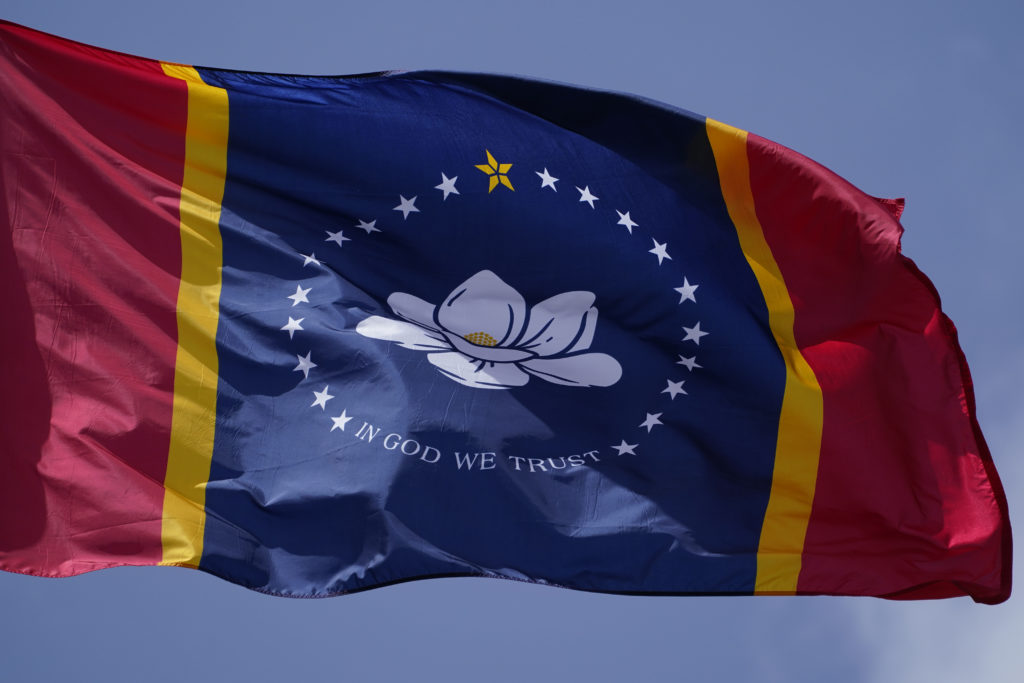
JACKSON, Miss. (AP) — Mississippi is updating its laws to include a new state flag with a magnolia and the phrase “In God We Trust,” six months after legislators ditched the last state flag in the U.S. that had the Confederate battle emblem.
Voters approved the magnolia flag in November after a commission recommended the design.
Legislators must put a description of the new flag into law. Senators on Wednesday (Jan. 6) voted 38-7 to pass such a bill, a day after the House voted 119-1.
Republican Gov. Tate Reeves is expected to sign the bill into law in the next several days. After that, officials will have a ceremony to raise the new flag at the Capitol.
The magnolia blossom on the new flag is encircled by white stars representing Mississippi as the 20th state, plus a single gold star representing Native Americans. The gold star is made of diamond shapes that are significant to the Choctaw culture. The flag also has gold stripes representing the artistic heritage of state that has produced blues great B.B. King, and Nobel Prize-winning novelist William Faulkner.
Democratic state Sen. Juan Barnett of Heidelberg, who is Black and a military veteran, said the old flag with the Confederate symbol divided the state but the new flag unites it.
“Those individuals like me who can go off and defend this country … and come home to a state that is not divided anymore, a state that has decided to come together — it has to feel good to those young men and women,” Barnett said after the Senate vote Tuesday. “It has to feel good to know that I can come back home not just to the United States of America but to the united state of Mississippi.”
Mississippi had used the same flag since 1894. The upper left corner had the Confederate battle emblem — a red field topped by a blue X with 13 white stars. Critics said for generations that the banner was a racist symbol that failed to represent a state with the largest percentage of Black residents in the nation.
Voters chose to keep the Confederate-themed flag in a 2001 election, but all of the state’s public universities and several cities and counties had stopped flying the flag in recent years. Conservative politicians, including Reeves, had long said if the flag was going to be changed, it should only be done by another referendum.
Momentum to change the flag built quickly in June as protests against racial injustice took place across the U.S. after Minneapolis police killed George Floyd, a Black man in their custody. Young activists and groups representing business, education, religion and sports — including the Mississippi Baptist Convention and the Southeastern Conference — lobbied legislators to dump the old flag and come up with a new one that could represent the diverse state.
“Our position on this is motivated by our understanding of the teaching of Jesus Christ,” Mississippi Baptist Convention Board Executive Director and Treasurer Shawn Parker said in a press conference June 23.
Parker referenced the golden rule found in Matthew 7:12 to do unto others as you would have them do unto you, and the second greatest commandment, to love your neighbor as yourself, found in Matthew 22:39.
“We take these teachings quite seriously and believe that this is indeed a moral issue and a Gospel issue for our state, and therefore we want to be not a political player in the process,” Parker said. “We want to be a prophetic voice, and our hope is that our stand and our conviction will bring healing to the racial tensions that are felt in Mississippi.”
After emotional debates, legislators voted in late June to make the change, and Mississippi has been a state without a flag for several months. The bill that retired the old flag specified that a commission would design a new one that could not include Confederate imagery and must have “In God We Trust,” and that the single proposed design would go on the ballot for a yes-or-no vote. About 71% of people who voted in November approved the change.
Republican Sen. Melanie Sojourner of Natchez voted Tuesday against putting the new flag into law because she wanted to keep flag with the Confederate symbol. Sojourner, who is white, also objected to the magnolia design being the only option on the ballot.
“I vowed to the people in my district that I would stand by their right to have a choice,” Sojourner said.
Baptist Press staff contributed to this article. From The Associated Press. May not be republished.















